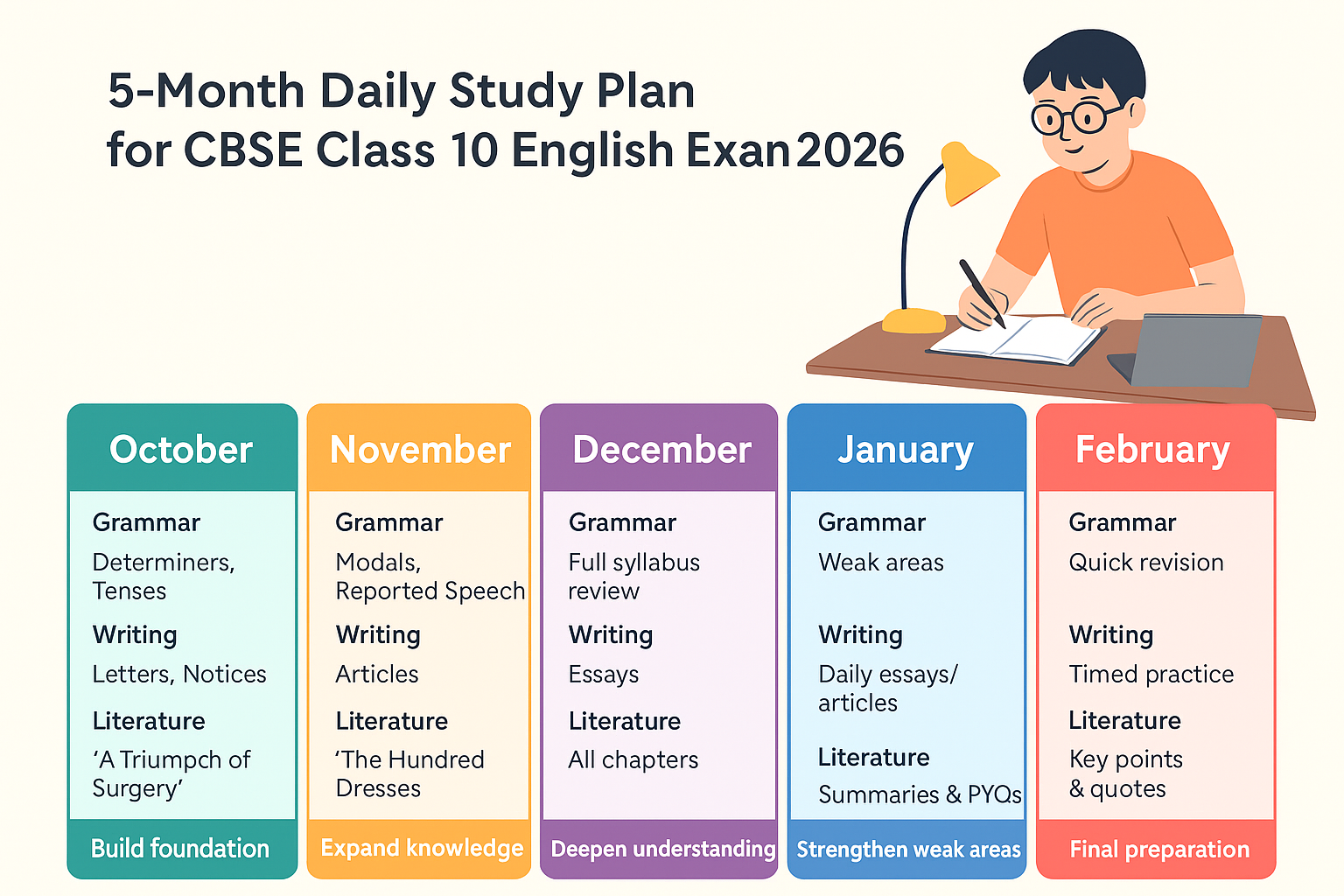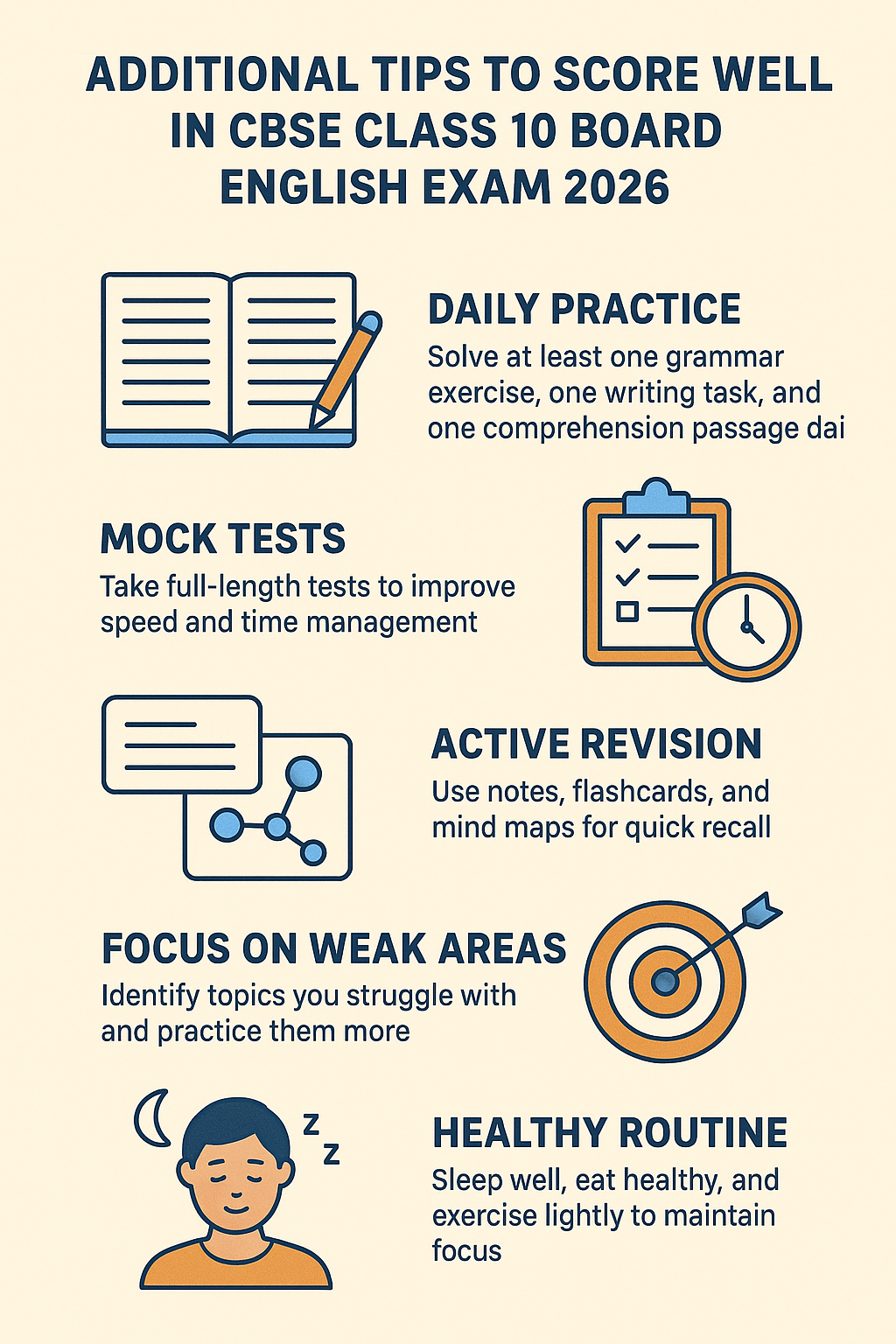CBSE Class 10 Board English Exam 2026: The Central Board of Secondary Education (CBSE) is tentatively going to conduct the Class 10 English Board Exam on 21 February 2026. This is the perfect time for students to follow a structured day-wise preparation strategy to ensure thorough coverage of the syllabus and boost their confidence.
A proper five-month study plan can guide students to revise grammar, writing, literature, and reading comprehension in an organized way while focusing on weak areas for improvement. This article provides a clear month-wise preparation strategy with helpful tips and techniques to practice regularly, manage time wisely, and boost confidence. Following this plan will support students in scoring well in the CBSE Class 10 English Board Exam 2026.
CBSE Class 10 Board English Syllabus 2025-26 |
CBSE Class 10 English 5 Month Study Plan for Board Exam 2026
Students preparing for their CBSE Class 10 English Board Exam 2026 need a structured approach to cover grammar, writing, literature, and reading effectively. This 5-month study plan will help them organize their preparation, strengthen key concepts, and boost confidence for the exam.
Month 1: October: Build the Foundation
Focus: Grammar Basics + Initial Literature + Writing Formats
Week 1: Grammar Foundations
Students can start with basic grammar topics — Determiners, Tenses, and Subject–Verb Concord.
-
Study rules and make short notes.
-
Practice 10 gap-filling questions daily.
-
Solve one grammar worksheet on the weekend.
Week 2: Writing Formats – Letters & Notices
Students can learn the structure of formal letters, notices, and posters.
-
Write one formal letter (complaint/application) every alternate day.
-
Practice 5 notices and posters using CBSE question examples.
-
Revise grammar from Week 1.
Week 3: Literature (First Flight – Initial Chapters)
Focus on:
-
A Letter to God
-
Nelson Mandela: Long Walk to Freedom
-
Poems: Dust of Snow, Fire and Ice
Students can read and summarize each chapter. Highlight new words, meanings, and moral lessons.
Week 4: Literature (Footprints Without Feet – Short Stories)
Read and analyze:
-
A Triumph of Surgery
-
The Thief’s Story
Focus on main characters, setting, and message.
Weekend task: Write short 30–40 word answers from these stories and revise grammar.
Month 2: November: Strengthen Concepts
Focus: Advanced Grammar + Writing Expansion + Literature Continuation
Week 5: Grammar – Modals and Reported Speech
Students can study modals (can, could, must, should, may) and reported speech (commands, statements, questions).
Practice: 10 transformation sentences daily and attempt one editing passage every two days.
Week 6: Writing Skills – Articles & Analytical Paragraphs
Students can learn to write analytical paragraphs (based on data, charts, or maps) and articles on social/environmental topics.
-
Practice 2 writing tasks per week under a 30-minute time limit.
-
Review sample answers from previous years.
Week 7: Literature (First Flight – Mid Chapters)
Focus on:
-
Two Stories About Flying
-
From the Diary of Anne Frank
-
Poems: A Tiger in the Zoo, How to Tell Wild Animals
Students can summarize lessons, key themes, and moral values. Practice 3–4 short answer questions daily.
Week 8: Literature (Footprints Without Feet – Mid Chapters)
Read:
-
The Midnight Visitor
-
A Question of Trust
Weekend: Revision quiz from October–November chapters.
Month 3: December: Revision + Practice Phase 1
Focus: Full Grammar + Writing Practice + Literature Deep Dive
Week 9: Grammar Consolidation
Students can revise all grammar topics — Determiners, Modals, Tenses, Subject–Verb Concord, and Reported Speech.
Daily: Attempt one worksheet and note repeated mistakes.
Week 10: Writing – Full Practice
Practice all formats:
-
Letter (2 tasks)
-
Article (1 task)
-
Analytical paragraph (2 tasks)
Time yourself for 30–40 minutes per writing task to simulate exam conditions.
Week 11: Literature (First Flight – Later Chapters)
Study:
-
Glimpses of India
-
Mijbil the Otter
-
Madam Rides the Bus
-
Poems: The Ball Poem, Amanda!
Make summaries, key points, and theme charts.
Week 12: Literature (Footprints Without Feet – Later Stories)
Focus:
-
Footprints Without Feet
-
The Making of a Scientist
-
The Necklace
Weekend: Solve one sample paper (complete 80-mark test).
Month 4: January: Final Preparation & Mock Tests
Focus: Revision, Timed Practice, and Weak Areas
Week 13: Literature (Final Chapters + Poems)
Study remaining chapters:
-
Bholi
-
The Book That Saved the Earth
-
Poems: The Trees, Fog, The Tale of Custard the Dragon, For Anne Gregory
Revise all poem meanings, rhyme schemes, and literary devices.
Week 14: Revision: First Flight
Students can prepare character sketches, key themes, and moral lessons from all chapters.
Write long-answer questions in 100–120 words from First Flight.
Week 15: Revision: Footprints Without Feet
Practice long-answer questions and 3–4 short-answer questions from each story. Weekend: Solve CBSE previous year question paper.
Week 16: Mock Test & Feedback
-
Attempt one full English paper under exam conditions (3 hours).
-
Check errors in grammar and writing sections.
-
Make short revision notes for weak areas.
Month 5: February: Quick Recap & Final Preparation
Focus: Final Revision, Confidence Building, and Exam Readiness
Week 17: Grammar & Writing Revision
-
Revise all grammar rules and common errors.
-
Practice 1 writing format daily (letters, articles, analytical paragraphs).
-
Attempt one editing task and one gap-filling daily.
Week 18: Literature Rapid Fire Round
Students can quickly review all chapters and poems using short notes and flashcards.
-
Focus on quotes, key messages, and characters.
-
Solve extract-based MCQs daily.
Week 19: Mock Tests & Time Management
Attempt 2–3 mock tests this week.
-
Simulate the exam environment.
-
Focus on speed and handwriting clarity.
Week 20: Final Week Before Exam
-
Light revision only.
-
Go through quick notes, poem meanings, and writing formats.
-
Sleep early, stay calm, and read one comprehension passage daily.

Additional Tips to Score Well in CBSE Class 10 Board English Exam 2026
To do well in the CBSE Class 10 English Board Exam 2026, students need to follow a consistent practice routine, revise effectively, and maintain a healthy study schedule. Check the given points to score well in the CBSE Class 10 exam 2026:

-
Daily Practice: Solve at least one grammar exercise, one writing task, and one comprehension passage daily.
-
Mock Tests: Take full-length tests to improve speed and time management.
-
Active Revision: Use notes, flashcards, and mind maps for quick recall.
-
Focus on Weak Areas: Identify topics you struggle with and practice them more.
-
Healthy Routine: Sleep well, eat healthy, and exercise lightly to maintain focus.
Revision Tips Before the CBSE Class 10 English Exam 2026
Students preparing for the CBSE Class 10 English Board Exam 2026 should follow these effective revision tips to strengthen their preparation and boost confidence before the exam.
-
Create a Quick Revision Schedule: Allocate specific time slots to revise grammar, writing formats, literature summaries, and important quotes. Focus more on weak areas.
-
Use Short Notes: Summarize important points, character details, and poems on flashcards or in a notebook for quick recall.
-
Practice CBSE Class 10 English Sample Papers and Previous Year Questions: Attempt at least 2–3 sample papers under exam conditions. This helps improve speed, accuracy, and confidence.
-
Revise Writing Formats: Quickly go through letters, notices, articles, story-writing structures, and essays to ensure you remember the formats clearly.
-
Focus on Important Literature Chapters and Poems: Revise summaries, key points, character sketches, and important quotes to answer literature questions accurately.
-
Solve Quick Grammar Exercises: Practice commonly tested topics like tenses, modals, determiners, and subject–verb concord for last-minute reinforcement.
By following this structured five-month study plan and incorporating daily practice, mock tests, and active revision, students can approach the CBSE Class 10 English Board Exam 2026 with confidence. Consistent effort, time management, and focus on weak areas will not only improve accuracy but also help in achieving top marks.
Also Check:
CBSE Class 10 English Sample Paper 2025-26: Download Free PDF
Comments
All Comments (0)
Join the conversation